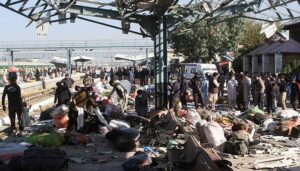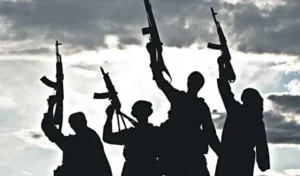Pakistan has been ranked as the world’s second-most terrorism-affected country, highlighting the escalating security challenges the nation faces. The ranking, based on recent global terrorism reports, reflects a surge in militant activities, including attacks on security forces, civilians, and infrastructure. The country has witnessed a sharp rise in terrorism, particularly in its border regions, where extremist groups continue to operate despite intensified military efforts.
The resurgence of militant activities has put immense pressure on law enforcement agencies and raised concerns over national stability. Experts attribute the growing threat to various factors, including regional instability, the resurgence of extremist groups, and the spillover effects of conflicts in neighboring countries. In response, Pakistan’s government and military have reaffirmed their commitment to eliminating terrorism through counterterrorism operations and intelligence-based efforts.
Historical Context of Terrorism in Pakistan
Terrorism in Pakistan can be traced back to several key factors, starting from the Soviet-Afghan War in the 1980s, when Pakistan played a critical role in supporting the Afghan mujahideen against the Soviet Union. This involvement, coupled with the country’s strategic position in the region, created an environment conducive to the rise of extremism. After the war, many of the fighters and militant groups returned to Pakistan, bringing their ideology and weapons with them, thus laying the foundation for militancy within Pakistan.

The situation worsened following the 9/11 attacks in 2001. Pakistan became a frontline state in the U.S.-led War on Terror, which brought increased military operations in its tribal areas and the subsequent growth of terrorist networks. This period marked the beginning of a long and bloody struggle against insurgent and militant groups operating in the country.
Impact of the War on Terror
Pakistan’s involvement in the War on Terror led to significant changes in its security landscape. Al-Qaeda, the Taliban, and a range of local militant groups began to target Pakistan’s military, security forces, and civilians. The country faced an onslaught of bombings, shootings, and suicide attacks, and the security situation became increasingly volatile. Cities, military installations, and law enforcement agencies were frequently attacked, with numerous terrorist attacks carried out by both domestic and international militant organizations.
Over time, Pakistan became the second-most affected country by terrorism, with the intensity and frequency of attacks escalating. According to the Global Terrorism Index (GTI), Pakistan has consistently ranked among the countries most impacted by terrorism, suffering thousands of deaths each year due to terror-related incidents.
Role of Militant Groups
Various militant groups, including the Tehreek-e-Taliban Pakistan (TTP), Lashkar-e-Taiba (LeT), and Baloch separatist groups, have played a key role in perpetuating terrorism in Pakistan. These groups have different ideological and political motivations, ranging from regional separatism to jihadist ideologies. They target a wide range of institutions, from government officials to ordinary citizens, in an effort to destabilize the state and challenge its authority.
The TTP, for instance, has been responsible for some of the most deadly attacks in Pakistan, including the 2014 attack on the Army Public School in Peshawar, which killed over 140 people, primarily children. Similarly, the LeT, a group linked to the 2008 Mumbai attacks, has also carried out numerous attacks in Pakistan, particularly in the Punjab region.
The Economic Cost of Terrorism
Terrorism in Pakistan has had a massive economic toll on the country. The costs are both direct and indirect, impacting every sector of society. The direct costs include the destruction of infrastructure, loss of human life, and the disruption of businesses and trade. Major cities, including Karachi, Peshawar, and Quetta, have seen a reduction in commercial activity due to terrorist attacks, affecting local economies.

The indirect costs are also significant. The constant threat of terrorism has led to a drop in foreign investment, tourism, and trade. The government has had to divert substantial resources to military operations and counterterrorism measures, leading to increased military spending and a strain on the country’s budget. This has hampered Pakistan’s ability to invest in other critical areas like education, healthcare, and infrastructure.
Terrorism’s Social Impact
The social fabric of Pakistani society has been deeply affected by terrorism. The constant threat of violence has created an atmosphere of fear and uncertainty, with many civilians feeling unsafe in their communities. The education system, particularly in areas like KP and FATA (Federally Administered Tribal Areas), has been disrupted, with schools and universities facing attacks. Children and young people have often borne the brunt of these attacks, with many being forced to live under the constant fear of bombings or shootings.
Ethnic and religious minorities in Pakistan, such as Shia Muslims, Hindus, and Christians, have also been frequent targets of terrorist groups, leading to sectarian violence and religious intolerance. The persecution of these minorities has compounded the already existing social divisions in the country and fueled further unrest.
Pakistani Government’s Counter-Terrorism Efforts
The Pakistani government has made various efforts to curb terrorism, with mixed results. The military has launched multiple operations against insurgent groups in the tribal regions, and the country has implemented counterterrorism laws and strategies. The military’s Operation Zarb-e-Azb, launched in 2014, was a significant operation aimed at clearing militant hideouts in North Waziristan and other tribal areas. This operation, along with subsequent security measures, significantly weakened terrorist networks in the region.
In addition to military operations, Pakistan has also worked to strengthen its counterterrorism framework, including the creation of specialized units and intelligence agencies to track and dismantle militant networks. However, the country still faces challenges in eliminating the threat, mainly due to the complex relationship between state and non-state actors in the region.
Challenges in Counterterrorism
Despite these efforts, Pakistan continues to face significant challenges in effectively combating terrorism. The presence of safe havens in neighboring Afghanistan and the porous nature of the Pakistan-Afghanistan border complicates counterterrorism efforts. Terrorists often find refuge across the border, making it difficult for Pakistan to deal with them comprehensively.

Furthermore, the complex political and social dynamics within Pakistan itself, including ethnic, religious, and tribal tensions, exacerbate the challenge. While the military and government have made gains in certain regions, there remain pockets of resistance, and militant groups continue to pose a significant threat, particularly in the northwestern tribal areas and in urban centers.
International Cooperation
Terrorism is a global issue, and Pakistan has worked to strengthen international cooperation in addressing this threat. Pakistan has collaborated with the United States, China, and other regional and international powers to combat terrorist organizations. The country has also been a key player in the broader efforts to combat extremism in South Asia.
However, Pakistan’s international relations on counterterrorism have been complicated by accusations from some countries that Pakistan has not done enough to combat specific terrorist organizations. These diplomatic tensions have sometimes hindered Pakistan’s ability to receive support or resources in its fight against terrorism.
The Future of Pakistan’s Counter-Terrorism Strategy
Looking forward, Pakistan’s counterterrorism strategy will need to evolve in response to the changing nature of terrorism. The country will likely continue its military operations against insurgent groups while also focusing on addressing the root causes of extremism, such as poverty, illiteracy, and political instability. There is also an increasing need for Pakistan to focus on its internal political dynamics, promoting national cohesion and strengthening governance to prevent the rise of future terrorist organizations.
Frequently Asked Questions
Why is Pakistan ranked as the second-most terrorism-affected country?
Due to a significant rise in militant attacks targeting security forces and civilians.
Which ranks Pakistan in this position?
Global terrorism indices and security reports highlight the surge in attacks.
What regions in Pakistan are most affected by terrorism?
Border areas, particularly Khyber Pakhtunkhwa and Balochistan, face the highest threats.
Who is responsible for the increasing terrorism in Pakistan?
Extremist groups, including Tehrik-i-Taliban Pakistan (TTP) and other militant factions.
How has terrorism impacted Pakistan’s security?
It has led to instability, loss of lives, and economic challenges.
What steps is the government taking against terrorism?
Intensified military operations, intelligence-based efforts, and stricter security measures.
How has the international community responded?
Countries have expressed concern and called for more vigorous counterterrorism efforts.
Has terrorism in Pakistan increased recently?
Yes, there has been a notable resurgence in attacks over the past year.
What are the leading causes behind this rise in terrorism?
Regional instability, militant resurgence, and spillover from Afghanistan’s crisis.
What is Pakistan’s strategy for combating terrorism?
A combination of military action, intelligence operations, and regional diplomacy.
Conclusion
Pakistan’s ranking as the world’s second-most terrorism-affected country highlights the growing security threats it faces. The surge in militant attacks, particularly in border regions, has raised serious concerns over national stability. Extremist groups continue to pose a formidable challenge despite ongoing military operations and intelligence efforts. The government has reaffirmed its commitment to eradicating terrorism, launching aggressive counterterrorism measures to combat rising threats. However, factors such as regional instability and militant group resurgence complicate the situation. The international community is closely watching Pakistan’s response, urging enhanced security strategies and regional cooperation.

